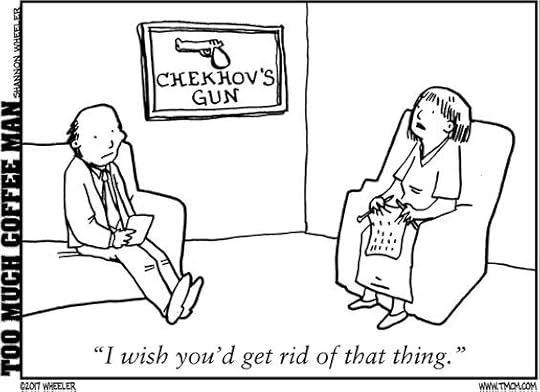Craig A. Hart's Blog
November 18, 2025
The Other Half of Chekhov’s Gun
In 1889, on a cold and likely snowy November day in Moscow, Anton Chekhov wrote a letter to Aleksandr S. Lazarev. In his strange little house on Sadovaya-Kudrinskaya Street, possibly while waiting for his next patient, he scrawled,
“One must not put a loaded rifle on the stage if no one is thinking of firing it. It’s wrong to make promises you don’t mean to keep.”
And thus began the popularized literary principle we know as Chekhov’s Gun. Certainly, this general knowledge existed before Chekhov (Greek tragedy, Shakespeare, French neoclassical drama), but there was something about how Chekhov phrased it that made it stick.
Today, we largely think of this principle as an exhortation to writers to keep the promises they make to readers. At the time of that particular letter, however, Chekhov was also concerned with the removal of unnecessary details. In later recollections by others, such as Sergius Shchukin, Chekhov elaborated by saying, “Remove everything that has no relevance to the story.”
In future letters to various recipients, he reiterated these ideas, pushing for economy in storytelling and the full use of whatever remained. But these days, we are mostly left with the distilled idea: If you show a gun hanging on the wall in Act I, it must go off by Act III.
So, while Chekhov did believe that a promise to the reader should be kept, he was also very much in favor of the idea that every important thing must be said, while every unimportant one should be mercilessly cut.

The reasons for the rest of us having kept part of the advice at the expense of the other are many and varied, not the least of which is that literary theory continued developing.
Hemingway, though an admirer of Chekhov’s, did not embrace his creed in toto. Certainly, Papa was a student of minimalism, but he was also a heavyweight champion of the unsaid. Those things left out were not, by default, unimportant. In the 1958 interview in The Paris Review, Hemingway gave an excellent description of his own writing philosophy and, at the same time, further developed Chekhov’s idea:
“…I always try to write on the principle of the iceberg. There is seven-eighths of it underwater for every part that shows.”
So, while Chekhov might have said, “If the gun is on the wall, it must fire,” Hemingway’s version might have gone, “If the gun is on the wall, the reader may never see it fire, but they will feel its weight.”
The original intent behind the gun principle also suffered thanks to the rise of more plot-driven and descriptive literary efforts, which resist cutting all unessential elements simply as a matter of style. After all, the presence of the gun is more memorable than its absence. While certainly not to be elevated to the domain of the masters, the rise of the pulp magazine and the peak of the mass market paperback — which in some ways foretold the kind of binge reading we now see with modern subscription services such as Kindle Unlimited — did not lend to this kind of restraint. And, certainly, current readers are much less interested in parsing through pages to find subtle symbolism than they are in the memorable and immediate.
In short, our current understanding of the gun principle — with its foreshadowing and satisfying payoff — is sexy. Cutting the dross, on the other hand, is the sort of thing that happens in a cold, drafty attic by the light of a single, flickering candle. But it can be argued that a great story needs the principle with both its parts. The fired gun provides the loud report. The ruthless cutting provides the room to let that report echo.
Perhaps the next time we are congratulating ourselves on the loud bang! of a discharging literary firearm, we could also stop and listen for the echo. If it’s not there, if the sound doesn’t reverberate, then maybe we haven’t given it enough room. Instead of asking only, “Did the gun go off,” perhaps we could also ask, “Should that gun have been in the room at all?”
And somewhere in Moscow, on a cold and snowy November day, a certain doctor-playwright will nod, put down his pen, and smile as he rises to answer the timid knock of an arriving patient.
The post The Other Half of Chekhov’s Gun appeared first on Craig A. Hart.
November 16, 2025
When Everything Is “On,” Maybe the Answer Is “Off”
When Everything Is “On,” Maybe the Answer Is “Off”
Share on X
Substack, email lists, ever-flashier websites.
I’ve grown tired.
And the symptoms of my weariness extend beyond work-related things and into personal living. Being connected 24/7, having instant access to anything and everything — it all has led to a kind of deep exhaustion. It’s not just the endless notifications. It’s the erosion of presence in the real world.
I catch myself scrolling through feeds during what should be quiet moments. It’s as if having a minute of peace is somehow anathema, when in fact it is what I secretly crave… and yet for some reason resist.
I find myself yearning for simpler — even if more inconvenient — times. (Remember when “downtime” actually meant time… down? No pings, no algorithms feeding you the next dopamine hit?)
But… A Blog?Yes, the blog as a medium is supposed to be dead (and it very well may be), but loading up this simple, pared-down, classic WordPress template brought me a surprising level of satisfaction. Just words on a page. Maybe a picture. It’s like rediscovering the joy of a handwritten letter over a rushed email — slower, for sure, but way more meaningful. (We should probably start writing letters again.)
I have no intention of becoming a Luddite (using the term in its currently popular definition), and technology not only fascinates me but is essential to work efforts. Yet there is still something to be said for having access to an “off” switch, one that you can toggle at will.
The freedom in that is immense.
And it’s not about rejecting progress. It’s about reclaiming myself.
Not all that long ago, it seems, TV shows aired one episode per week — there was no such thing as “binging” on them, unless you bought the DVD set at the end of the run. That anticipation built community. You could discuss the latest plot twist at work or with friends the next day, not spoil it instantly via social media.
And if you wanted anything other than pizza or Chinese food for dinner, you had to get in your car and go get it. Same with groceries. Same with everything else (delivery culture is out of control).
And It’s Not Just MeThis shift isn’t just personal. It’s also cultural. Studies on digital overload show rising rates of anxiety and burnout, especially among younger generations who’ve never known a world without smartphones(!). Sure, we’re wired for novelty. But constant stimulation is destroying what makes us human, and is eroding our ability to enjoy being human.
So I have taken steps in my personal life to pump the brakes. Delivery services cancelled and more errands run on my own. Streaming services cancelled or scaled back. Investing more in media I can hold in my hands (and truly own). Purchasing an analog watch so I can check the time without pulling out my phone and staring at it like some dumb ol’ monkey and almost always getting sucked into some algorithm that does not have my best interest at heart (even if it had one).
I’ve revived old habits like reading physical books unconnected from the internet. I’m enforcing some pretty strict screen time limits on the younger people in the house. The children claim to hate that, of course, but once we push through the complaining, the dividends are increased use of imagination and improved social behaviors.
Of course, this isn’t a full retreat; I’m still typing this on a computer, after all. But it’s an effort at balance. I make no promises about the future of this blog, as I certainly don’t need yet another techy master to rear its ugly head. But I am looking forward to whatever happens with it — if anything.
If nothing else, it’s place I can share thoughts, books, and ideas without being tied into some sort of weird ecosystem that gamifies… well, everything.
This could be fun!
The post When Everything Is “On,” Maybe the Answer Is “Off” appeared first on Craig A. Hart.
November 26, 2024
An Enhanced Audiobook!
Here's something that's been on the back burner for quite some time, but now I am happy to report that it is now on the ... well, front burner!
And that is a production of the first Serenity book (which has been updated and rewritten!) in glorious new audio. This new version is something special: an enhanced version with sound effects and music, and narrated by yours truly. As it rolls out, I will be offering it episodically as a podcast for free, available on places like Apple Music, Amazon Music, and through your browser.
https://feeds.transistor.fm/serenity-...
ABOUT THE PROJECT
Immerse yourself in the gritty world of Shelby Alexander with this enhanced audiobook of Serenity, narrated by author Craig A. Hart.
When a young woman dies in his arms, retired prizefighter Shelby is drawn into a deadly web of small-town secrets and violence.
With atmospheric soundscapes, a stirring soundtrack, and realistic sound effects, this audiobook brings Northern Michigan's dangerous underbelly to life. Experience the first book in the bestselling Shelby Alexander Thriller Series like never before in this heart-racing audio adventure.
October 22, 2022
tl;dr – the stories are back
Over the last three years or so, however, life happened, and my focus was split by endeavors other than writing. I began narrating audiobooks, averaging around 50 books per year since 2019. I also put my experience as a sound engineer to work and produced many audiobooks for other narrators and publishers (I’ve completely lost track of that number, but it’s a lot).
Although my writing suffered, I never forgot it. And now I am pleased and excited to find myself in a position to once more make writing my primary focus. I will still be doing some audio production–I do love that–but writing stories will be the priority. I have many cool new things coming down the pike, so stick around and let’s have some fun.



